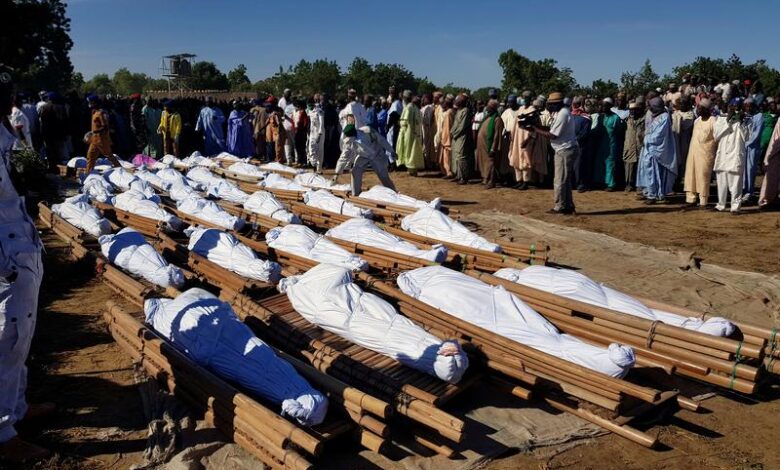CIVIC Condemns ISWAP Massacre In Borno, Asks Nigeria To Beef Up Security
“This attack is only one among many attacks that continue to threaten the lives and livelihoods of civilians in Northeast Nigeria.”

The Center for Civilians in Conflict (CIVIC), an international non-profit that advocates for the safety of civilians in areas rocked by armed violence, has condemned the mass killing of people in Kala Balge, Northeast Nigeria.
Members of the Islamic State West Africa Province (ISWAP) had on Sunday, May 22, killed scores of residents in villages close to the Kala Balge’s capital. According to one security source, many of the victims were farmers who had been harvesting produce. Their throats were slit and their bodies severed.
While the state authorities give the number of those killed as 32, as many as 60 people could not be accounted for.
In a statement released on Thursday, May 26, CIVIC decried the incident “in the strongest possible terms”.
“Civilians are being targeted over and over again in Northeast Nigeria. They continue to be slaughtered with impunity while farming and seeking livelihoods,” observed the non-profit’s Nigeria country director, Benson Olugbuo.
“We utterly condemn this attack and urge all parties to the conflict, state and non-state armed actors alike, to refrain from targeting and harming civilians. The perpetrators of civilian killings should be held accountable.”
CIVIC maintained that civilians should not be harmed because of their engagements with government forces.
Olugbuo said the attack is only one among many that “continue to threaten the lives and livelihoods of civilians in Northeast Nigeria. Nearly 13 years after the start of the armed insurgency, women, men, and children are still living in fear, fleeing from one location to another and wondering when and where the next attack will be.”
Major-General Christopher Musa, theatre commander of Nigeria’s counterterrorism operation in the region, said on Tuesday that the military was investigating what truly happened in the community.
As this is ongoing, said CIVIC, Nigeria’s government should also “scale up security patrols in Borno State to reassure civilians and allow them to farm and carry out other livelihood related activities”.
“The Nigerian military should also consult civilian communities affected by this attack and other incidents about measures that could be taken to strengthen their self-protection strategies in order to minimize harm when attacks occur,” the group added.
Different reasons have been suggested for the terror attack and massacre.
According to one account, the terrorists were grieving the death of their commander killed in a military operation and took out their frustration on the victims. Umar Ari, a member of a local militia supporting state forces, claimed those killed were accused of sharing information on ISWAP positions with the military.
Conflict research consultant Malik Samuel, however, said the allegation against the villagers was that they were stealing from ISWAP’s underground grain store.
“In spite of being warned against it, they continued taking grains from the storage,” he wrote on Thursday. “Some scavengers of scrap metal from the village had discovered the underground storage containing maize and guinea corn, thinking it belonged to villagers who had fled the crisis.”
Samuel explained that the villagers started helping themselves to the foodstuff because of a lack of food. The ISWAP insurgents who later attacked had reportedly arrived on 10 motorcycles, with each carrying about three men.
In Nov. 2020, the rival Shekau-led faction of Boko Haram had similarly killed over 70 migrant farmers in Koshebe, a village in Jere, Borno State, accusing the victims of informing on its members.
Support Our Journalism
There are millions of ordinary people affected by conflict in Africa whose stories are missing in the mainstream media. HumAngle is determined to tell those challenging and under-reported stories, hoping that the people impacted by these conflicts will find the safety and security they deserve.
To ensure that we continue to provide public service coverage, we have a small favour to ask you. We want you to be part of our journalistic endeavour by contributing a token to us.
Your donation will further promote a robust, free, and independent media.
Donate HereStay Closer To The Stories That Matter




